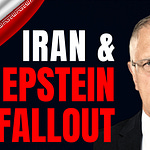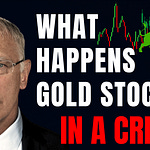Doug and I sat down recently to take questions from our Crisis Investing subscribers, and as usual the conversation wandered across half a dozen big themes: AI, the skyscraper effect, gold and rare earths, Uruguay, Europe, war economies, and a little bit about The Preparation and my son’s journey from boy to man.
Instead of giving you a bullet-point recap, I want to give you the substance of what we actually said and why it matters.
AI: The Real Divide Is Between Those Who Use It and Those Who Whistle Past the Graveyard
A lot of people still think there’s a protected class of “AI-proof jobs.” There isn’t. It’s only a timing issue.
White-collar work gets hit first because it’s all text and pixels. Blue-collar work gets hit later because you have to physically build and distribute robots and that takes longer. But the end state is the same: everything gets touched.
The mistake comes from people imagining that because today a robot can’t do X, it never will.
That’s not how technology curves work.
The real danger isn’t AI itself. It’s the political class grabbing it first and using it to centralize power. Technology has always improved human life until governments get their hands on it.
If you’re an individual, the move right now is obvious:
Use AI as a force multiplier.
Don’t be the person who ignored it out of pride or fear.
Those people get flattened first.
Is Cipriani Punta del Este a “Skyscraper Effect” Warning Sign?
Someone asked whether the giant Cipriani project in Punta del Este is a sign of a top, a local version of the old “Empire State Building gets built right before the crash” observation.
I get the instinct behind the question, but in this case it misses the bigger picture.
Punta del Este isn’t a normal market.
It’s a cultural magnet for Argentina and Brazil’s upper classes, a deeply ingrained habit at this point, reinforced through crises, currency collapses, and political insanity.
Add Europeans, Canadians, and an accelerating number of Americans trying to get out of their own collapsing systems, and you get a very different equation.
Supply is tight. Demand isn’t going anywhere.
The skyscraper metaphor is interesting, but it’s not the whole story.
Commodities: Gold, Silver, Uranium, Rare Earths - The Setup Is Still Bullish
Here’s the short version of Doug’s view (which I share):
Gold: Near all-time highs, but retail buyers still aren’t in. That alone tells you this isn’t the end of the move.
Silver: In real terms, it’s still about 20% of its 1980 peak. That’s insane.
Uranium: Simple story — there isn’t enough supply, and the world is quietly admitting it needs nuclear.
Rare Earths: China doesn’t have some secret formula. They were willing to do the ugly, chemical-intensive refining work while the West regulated itself into a corner. That’s reversible and it will reverse.
We recommended MP Materials early, and that turned out to be the exact right horse at the exact right moment. There will be more opportunities like that as governments panic about supply chains.
Our Book With Maxim, and Where It Ranks for Me Personally
Someone asked where The Preparation ranks among my accomplishments. Honestly, for me this one isn’t complicated.
It changed my son’s life.
It accelerated his path from boy to man.
Nothing else I’ve done comes close.
Commercial success?
We’ve sold almost 14,000 copies as a completely self-published book. That already puts it in the top tiny percentage of all books sold in a normal year.
My personal benchmark for “commercial success” would be 50,000 copies, because that’s the point where the ideas start filtering into the culture in a real way.
But ranking it? It’s at the top already.
Uruguay: Still “Backward,” and That’s Exactly the Point
Doug first visited Uruguay in 1980 and described it as stepping back into the 1930s — black-and-white-movie cars, rotary phones, and a country moving at a different pace.
A lot has changed since then, but the cultural rhythm hasn’t.
Uruguay is backward in the sense that life still moves at the speed of sanity. That’s precisely why it’s attractive. If you can “go back in time” 20 years, you take that deal.
What people misunderstand is the social dynamic: Uruguay is small enough that everyone is one degree from everyone else. That means the tall-poppy effect is real. People don’t like seeing someone get too ambitious or too different. It creates friction.
But as a foreigner, you’re allowed quirks.
You aren’t held to the same social rules.
It’s one of the gifts of being here.
For what it’s worth, I just got my Uruguayan citizenship and passport. Doug and I are now both citizens.
Is There a Solid Plan B Country in Europe? Short Answer: No
Europe has a 2,000-year habit of internal conflict. Its nation-states are fragile, many of them artificial, and the EU bureaucracy is marching toward war with Russia while simultaneously importing populations that guarantee future internal conflict.
Free speech is dying there.
Debt is terminal.
National cohesion is fracturing.
Portugal rug-pulled its golden visa program and even shafted people who were months away from citizenship. That tells you everything.
I wouldn’t bet my future on any European state right now.
War Economies, State Behavior, and Why We’re Sliding Toward Something Ugly
Someone asked: At what point does an economy become a war economy?
The uncomfortable truth is that the natural state of governments is predation. War was the easiest way to get what you wanted for most of human history - slaves, gold, cattle, art - and that mentality never went away.
The tools just changed.
A war economy is simply a political class looking for a way to survive its own fiscal rot. If they can’t get an external war, they create internal enemies. You’re seeing both brewing.
Big systems are failing in obvious ways, and individuals who adapt early will have an enormous advantage.
Whether it’s learning to use AI, getting out of jurisdictions that are deteriorating, or positioning yourself in real assets and real skills the winners of the next decade are the ones who move while everyone else is still trying to pretend things are normal.
More next week.
Matt
00:00 Introduction and Subscriber Questions
00:18 Impact of AI on Business and Employment
01:20 Universal Basic Income and Future of Work
06:53 Embracing AI and Technological Advancements
07:50 Skyscraper Effect and Real Estate Market
13:14 Crisis Investing Sentiment on Commodities
18:17 Rare Earths and Global Production
21:45 Higher Ground Novels and Future Plans
23:24 Monetary Metals and Gold Lending
24:19 The Value of Gold and Counterparty Risk
25:09 War Economy and Its Implications
28:34 US Foreign Policy and Venezuela
32:15 Uruguay: A Step Back in Time
39:20 Plan B Destinations in Europe
43:17 Concluding Remarks and Future Plans












